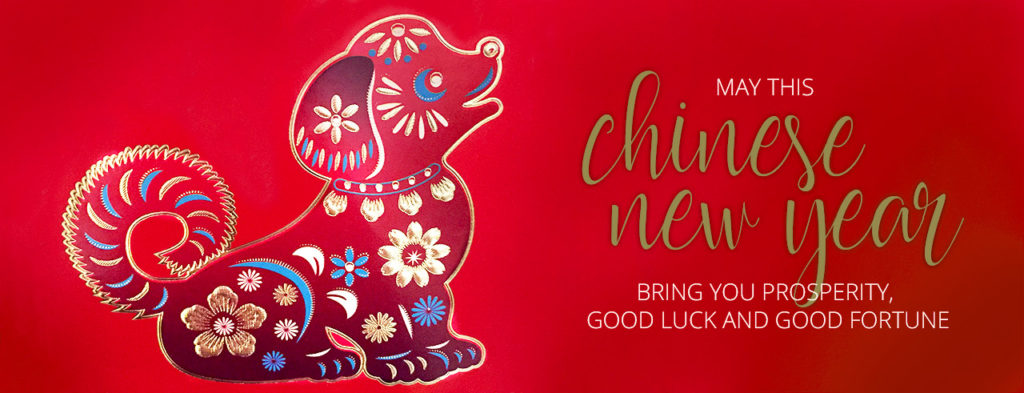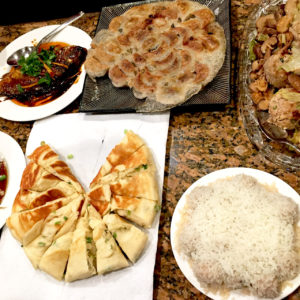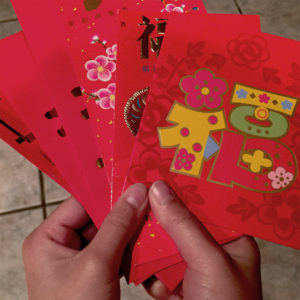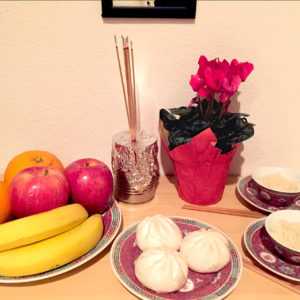
Chinese New Year in 2018, also known as Lunar New Year and Spring Festival, begins on February 16th and ends March 2nd. This is the year of the Dog; the most defining characteristic is their loyalty. They will never abandon friends, family or work.
Every year, my family gets together to celebrate Chinese New Year. It’s a tradition we have always kept and would like to continue for generations. I honestly don’t remember a lot of the traditions we used to do when I was a kid. But even if traditions change, being together as a family has always been the most important part. Here’s a few traditions we still celebrate as a family and share with our kids.
 Reunion Dinner
Reunion Dinner
Family is the basis of the Chinese society. A family gathering for Lunar New Year is what the Chinese consider to be the most important part of the celebration. For many years, we have gathered at my brother’s house to celebrate. Thanks to my brother and his family, we always have plenty of food. Having an abundance of food is believed to bring great material wealth in the new year. We traditionally have dumplings at dinner. They’re shaped like ancient Chinese silver and gold ingots. By wrapping dumplings, you are wrapping in the fortune. By eating them, you are sending away the old and welcoming the new and you will live a wealthy and prosperous life.
 Red Envelopes
Red Envelopes
Red envelope… what is this magical red thing? Does it have money in it? Yes, but not just any money. The money in red envelopes is known as “lucky money” or “New Year’s money.” For Chinese New Year, the red envelopes are given from elders to the unmarried children. It’s called “ya sui qian” in Mandarin or “li shi” in Cantonese. It’s purpose is to protect the young ones in the upcoming year and grant them prosperity. This tradition has always been in my family since I was born, and we still pass red envelopes to all the children in our family.
The folk tale: During the Tang Dynasty, the Emperor gave money to his mistress’ born son as gift money. From time to time, dynasty to dynasty, the practice has passed on for ‘red envelopes’ to symbolize good luck for weddings, celebrations, success and gifting.
 Ancestor Worshiping
Ancestor Worshiping
Family is viewed as a closely united group of living and dead relatives. This year my family will hold an offering of joss sticks at the house and bow three times to send prayers and greetings to my mom, dad and all our ancestors. This is also a way to show them that we miss them. With offerings of fruit, food, sweets and flowers, the spirits of the ancestors are invited to join the celebration. It is a religious practice based on the belief that deceased family members have a continued existence, that the spirits of deceased ancestors will look after the family, take an interest in the affairs of the world, and possess the ability to influence the fortune of the living.
There’s so much more to the Chinese culture and how New Year is celebrated with different traditions and food dishes all over China. These are my favorite family traditions that we still celebrate. Even as you get older, priorities change or the kids grow up, try to make time to keep some of your family and cultural traditions. You may not realize how precious it all is, until it’s too late and you forget it all. I recently realized it myself since this will be our first Chinese New Year without my Mom. It’ll be hard to celebrate without her, but we know that she’s always watching over us and wishing us good fortune.
Wishing you and your family a happy and prosperous Chinese New Year!
Love,
Jeannie
Leave a Reply